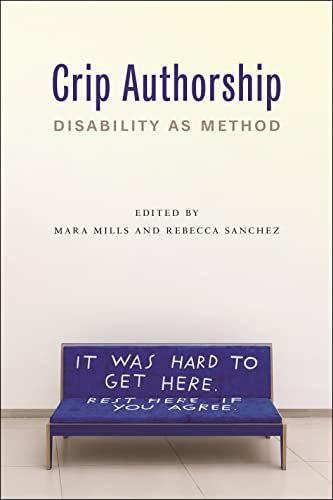
Crip Authorship: Disability as Method

To crip, like to queer, means to get into the process of unsettling, to make something twisted and strange (McRuer 2018). Cripping denaturalizes the normative culture of compulsory able-bodiedness and able-mindedness and invents new ways to counter intersecting forms of oppression.
Rebecca Sanchez • Crip Authorship: Disability as Method
What if one collaborates in all aspects of the research, including theorizing, researching, developing, and outlining an article, but someone else writes up the notes, bullets, fragments, and so on and turns them into paragraphs? What if someone or multiple people talk while someone else writes it down—who is considered the author? Who is
... See moreRebecca Sanchez • Crip Authorship: Disability as Method
Kafer, Alison. 2013. Feminist, Queer, Crip. Bloomington: Indiana University Press.
Rebecca Sanchez • Crip Authorship: Disability as Method
community-based critical participatory action research (CPAR)—“
Rebecca Sanchez • Crip Authorship: Disability as Method
it could include reclining chairs that allow people with ME/CFS to rest while making community in-person. Changing the dismissive attitude toward “contested” chronic illnesses may lead to better resources to manage symptoms—not toward a medical “cure” or elimination, but toward greater access to social worlds.
Rebecca Sanchez • Crip Authorship: Disability as Method
To live on a kind of “competence probation” is an everyday reality for many; to be required to continually, repetitively demonstrate capacity.
Rebecca Sanchez • Crip Authorship: Disability as Method
Is complex language the only way we can imagine new ways of thinking and being? Who do we exclude from new thinking about disability when we use big words and complicated sentences?
Rebecca Sanchez • Crip Authorship: Disability as Method
“human-centered design approach”
Rebecca Sanchez • Crip Authorship: Disability as Method
radical compassion is an exhortation to ethically walk and sit and study and fight and build and suffer and celebrate with another whose condition may be utterly unlike your own.